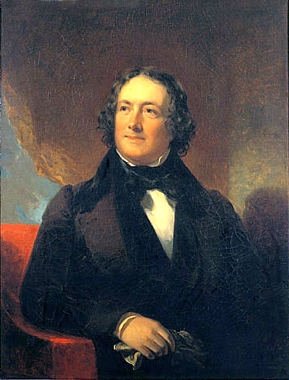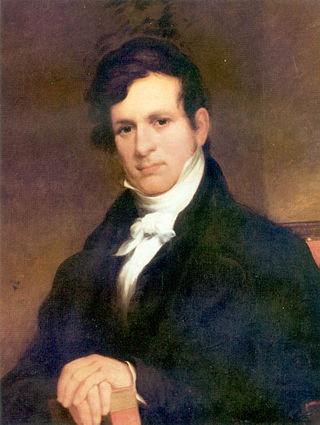Related Research Articles

Andrew Jackson was the seventh president of the United States, serving from 1829 to 1837. Before his presidency, he gained fame as a general in the U.S. Army and served in both houses of the U.S. Congress. Sometimes praised as an advocate for working Americans and for preserving the union of states, Jackson is also criticized for his racist policies, particularly regarding Native Americans.

The Hermitage is a historical museum located in Davidson County, Tennessee, United States, 10 miles (16 km) east of downtown Nashville in the neighborhood of Hermitage. The 1,000-acre (400 ha)+ site was owned by President Andrew Jackson, the seventh president of the United States, from 1804 until his death at the Hermitage in 1845. It also serves as his final resting place. Jackson lived at the property intermittently until he retired from public life in 1837.

Nicholas Biddle was an American financier who served as the third and last president of the Second Bank of the United States. Throughout his life Biddle worked as an editor, diplomat, author, and politician who served in both houses of the Pennsylvania state legislature. He is best known as the chief opponent of Andrew Jackson in the Bank War.

John Henry Eaton was an American politician and ambassador from Tennessee who served as U.S. Senator and as U.S. Secretary of War in the administration of Andrew Jackson. He was 28 years, 4 months, and 29 days old when he entered the Senate, making him the youngest U.S. Senator in history.

Rachel Jackson was the wife of Andrew Jackson, the seventh president of the United States. She lived with him at their home at the Hermitage, where she died just days after his election and before his inauguration in 1829—therefore she never served as first lady, a role assumed by her niece, Emily Donelson.

Sarah Jackson was an American woman who was the White House hostess and acting first lady of the United States from November 26, 1834, to March 4, 1837. She served in this role as the daughter-in-law of U.S. president Andrew Jackson after marrying his adopted son, Andrew Jackson, Jr. She had initially been named as mistress of the Jackson residence in Tennessee, the Hermitage, but she moved to the White House and became co-hostess with Emily Donelson after the Hermitage was damaged in a fire. When Donelson fell ill, Jackson took on the position of White House hostess in its entirety for the remainder of the term. After leaving the White House, she returned to the repaired Hermitage, living there for the remainder of her life.

Charles Dickinson was an American attorney and slave trader who was killed by Andrew Jackson in a duel. An expert marksman, Dickinson was shot in the chest by the future president due to a protracted disagreement which originated in an incident involving a horse which Jackson owned. Jackson himself was also wounded in the duel, but was able to recover.

Lyncoya Jackson, also known as Lincoyer or Lincoya, was an Indigenous American from a family that was a part of the Upper Creek tribal-geographical grouping and more than likely affiliated with Red Stick political party. The family lived in the Muscogee tribal town at Tallasseehatchee Creek in present-day eastern Alabama. Lyncoya's parents were killed on November 3, 1813, by troops led by John Coffee at the Battle of Tallusahatchee, an engagement of the Creek War and the larger War of 1812. Lyncoya survived the massacre and the burning of the settlement and was found lying on the ground next to the body of his dead mother. He was one of two Creek children from the village who were taken in by militiamen from Nashville, Tennessee. Lyncoya was the third of three Indian war orphans who were transported to Andrew Jackson's Hermitage in 1813–14. The other two, Theodore and Charley, died or disappeared shortly after their arrivals in Tennessee, but Lyncoya survived and was raised in the household of former slave trader and ex-U.S. Senator Andrew Jackson.

The Treaty of Pontotoc Creek was a treaty signed on October 20, 1832 by representatives of the United States and the Chiefs of the Chickasaw Nation assembled at the National Council House on Pontotoc Creek in Pontotoc, Mississippi. The treaty ceded the 6,283,804 million acres of the remaining Chickasaw homeland in Mississippi in return for Chickasaw relocation on an equal amount of land west of the Mississippi River.

The following is a list of important scholarly resources related to Andrew Jackson.
Andrew Jackson, I am given to understand, was a patriot and a traitor. He was one of the greatest of generals, and wholly ignorant of the art of war. A writer brilliant, elegant, eloquent, without being able to compose a correct sentence, or spell words of four syllables. The first of statesmen, he never devised, he never framed a measure. He was the most candid of men, and was capable of the profoundest dissimulation. A most law-defying, law-obeying citizen. A stickler for discipline, he never hesitated to disobey a superior. A democratic autocrat. An urbane savage. An atrocious saint.

Andrew Jackson, the seventh U.S. president, was a slave owner and slave trader who demonstrated a lifelong passion for the legal ownership and exploitation of enslaved black Americans. Unlike Thomas Jefferson and George Washington, Jackson "never questioned the morality of slavery."

Lewis Robards was an American Revolutionary War veteran and Kentucky pioneer who is best remembered as the first husband of Rachel Jackson, who was later married to Andrew Jackson, elected U.S. president in 1828.

Andrew Jackson bought and sold slaves from 1788 until 1844, both for use on his plantations and for short-term gain through slave arbitrage. He was most active in the interregional slave trade, which he termed "the mercantile transactions," from the 1790s through the 1810s. Available evidence shows that speculator Jackson trafficked people between his hometown of Nashville, Tennessee, and the slave markets of the lower Mississippi River valley.
The circumstances of the end of Rachel Donelson's relationship with Lewis Robards and transition to Andrew Jackson resurfaced as a campaign issue in the 1828 U.S. presidential election. As Frances Clifton put it in her study of Jackson's long friendship with John Overton, "Jackson's irregular marriage proved good propaganda for the friends of Adams and Clay. The political enemies of Jackson 'saw in his wife a weak spot in his armor through which his vitals might be reached; and they did not hesitate to make the most of it.'"

John Hutchings was a nephew by marriage of American slave trader, militia leader, and U.S. president Andrew Jackson. He was Jackson's partner in his general stores, and his slave-trading operation.
William Preston Anderson (1774–1831) was a United States Attorney, colonel during the War of 1812, surveyor, and land speculator in Tennessee and Alabama, United States. He is best known today for his association with U.S. president Andrew Jackson and as the father of a general of the Confederate States Army.
Edward Ward was a businessman and politician of the United States. Originally from Virginia, Ward was land owner and Tennessee state legislator. Ward bought Andrew Jackson's second plantation, the 640-acre Hunter's Hill, from him for $10,000 in 1804. Ward served as president of the Clover Bottom Jockey Club, reportedly won $500 in gold off Andrew Jackson in a bet on a fight between gaffed cocks, and along with Jackson was involved in land speculations in vicinity of Huntsville, and Florence, Alabama. In 1809, Ward bought 4,500 acres (7.0 sq mi) of land in western Madison County, Alabama for over US$13,000.
Andrew Jackson, the seventh president of the United States, and his wife Rachel Donelson Robards Jackson had no biological children together but served as guardians to a large number of children, several of whom lived at the Hermitage at one time or another. Many of these children were members of the extended Donelson family, others were the children of Jackson's friends. Andrew Jackson also sent home three male Native American babies or children, who were called Charley, Theodore, and Lyncoya, who were collected before and during the Creek War, a subconflict of the War of 1812 and the first of Jackson's decades-long military and political campaigns to ethnically cleanse the south for white settlers so that their black slaves could plant cotton, a highly profitable cash crop. Lyncoya has been described as having been "adopted" by the Jacksons but there are no known documents attesting to any form of legal adoption. This was also the case for "the only ward that he and Rachel considered to be a child of theirs," Andrew Jackson Jr. There are no judicial or legislative records any of these "adoptions", and statutory family law was essentially non-existent in early 1800s Tennessee.
This is a list of people for whom Andrew Jackson, seventh U.S. president, acted as pater familias or served as a guardian, legal or otherwise. As Tennessee history writer Stanley Horn put it in 1938, "Jackson's friends had a habit of dying, and leaving their orphans to his care." As Jackson biographer Robert V. Remini wrote in 1977, "The list of Jackson's wards is almost endless...new names turn up with fresh examination." There was no comprehensive index of the wards until Rachel Meredith's 2013 master's thesis. Some of Jackson's wards would have lived at Hunter's Hill, and others would have grown up at what is now called the "Log Hermitage," which was originally a two-story blockhouse and was later converted for use as a slave cabin.
References
- ↑ Various; Jackson, Andrew (1980). Smith, Sam B.; Owsley, Harriet Chappell; Moser, Harold D. (eds.). The Papers of Andrew Jackson, Volume I, 1770–1803. Knoxville, Tennessee: University of Tennessee Press. ISBN 978-0-87049-219-8. LCCN 79015078. OCLC 5029597.

- 1 2 3 4 Remini, Robert V. (1977). Andrew Jackson and the Course of American Empire, 1767–1821. New York: Harper & Row. ISBN 978-0-8018-5912-0. LCCN 77003766. OCLC 1145801830 – via Internet Archive.

- ↑ Overton, John. "Entry for Andrew Jackson's distilling operations (line 21)". Jacob McGavock Dickinson Papers. Federal Distillery Tax Book for Tennessee, 1796–1801. Tennessee State Library and Archives. 42918_120. Retrieved 2024-08-26– via Tennessee Virtual Archive.